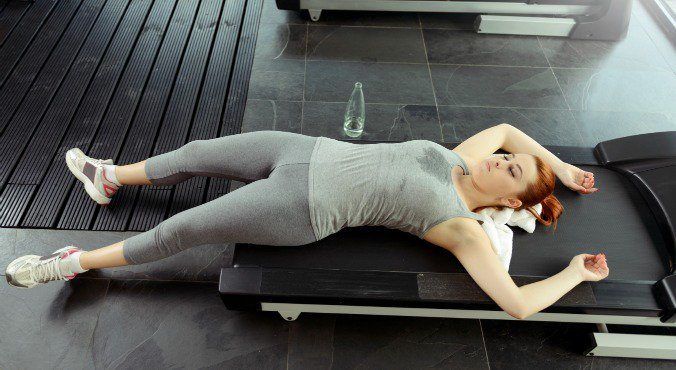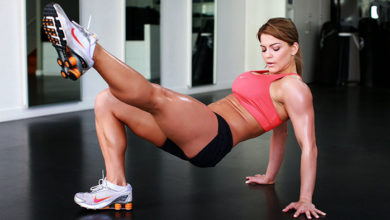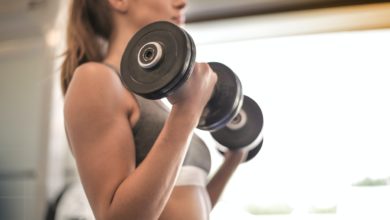
What Is Post Exercise Fatigue Syndrome?
Post exercise fatigue syndrome can play havoc with your progress, goals and health. It’s more than just tiredness and soreness and can be linked to other health disorders. If you’re wondering why you’re feeling exhausted after your workouts, give this article a read…
Once you’re hitting the gym on a regular basis it becomes ingrained in your daily routine, especially once you start to see fat melt away and your fitness levels increase. Your motivation is at an all-time high, and you feel ready to take on the world.
But not all women get that luxury.
Feeling tired after a tough, sweaty workout is completely normal. But persistent, extreme fatigue isn’t.
And it can make it near impossible to reach your fitness and physique goals.
In this article we talk about post exercise fatigue syndrome. And why chronic exhaustion is much more than working out too hard.
What Is Post Exercise Fatigue?
Part of any successful exercise program is taking your body past its comfort zone. You have to progressively and consistently overload your muscles and cardio system to force it to adapt.
It’s all about gritting your teeth, giving it your all, and developing a strong female attitude – motivated, driven and unrelenting in your quest for a stronger, leaner figure.
But more isn’t always better. Work too hard for too long and you’ll soon begin to suffer fatigue, burnout and staleness.
Post exercise fatigue syndrome indicates an intolerance to high-intensity exercise
As a multi-factorial disorder, post exercise fatigue syndrome is characterized by multiple symptoms.
- Constant and excessive tiredness, fatigue and loss of energy
- Pain and stiffness in the muscles and joints used during exercise
- Sickness, nausea and vomiting
- Headaches and dizziness
- Unusual or unexpected breathlessness and high heart rate
These symptoms can last for well over 24 hours and have a severe effect on day-to-day life. It’s completely different to the soreness and discomfort you get from something like delayed onset of muscle soreness (DOMS).
Symptoms can be moderate, strong or completely debilitating. Imagine getting severe flu every time you worked out.
That’s post exercise fatigue syndrome.
It’s not only high-intensity workouts that can cause this disorder either. For some people, moderate intensity exercise can be a trigger. Even a long walk can cause exhaustion, only fixed with bed rest.
Extreme fatigue after exercise – why do you feel so tired?
Although fatigue is often restricted to larger muscles such as your legs, arms and upper body, it can also affect smaller muscles in the hands and feet too.

Post exercise fatigue syndrome is a complex condition.
Often called exercise intolerance, it refers to the inability to maintain exercise exertion at a given level.
Post exercise fatigue syndrome is far more severe than the type of fatigue you’d experience from a normal workout. And the mechanisms that cause it can be varied.
This is what makes it a syndrome.
It’s not a disease or illness in its own right, but could be caused by other disorders such as heart conditions, respiratory illness, chronic fatigue or genetic disorders.
If you feel fatigued for days and days after your workout, you may have an underlying issue such as post exercise fatigue syndrome.
Like with any health-related condition, you need to see your health professional if you have concerns.
Those with chronic fatigue disorders often have issues with regulating oxygen consumption.
They can’t process energy like other people, and as such, can’t get fuel to their cells efficiently enough to power their bodies during exercise. In this context, post exercise fatigue syndrome is down to a metabolic ‘fault’.
Some suffers of chronic fatigue fall victim to mitochondrial dysfunction. The function of your mitochondria is to help turn energy from food into a usable type of energy called ATP.
If your mitochondria can’t work effectively, you can’t make energy fast enough to sustain exercise for either intense or long periods of time.
There’s also a relationship between post exercise fatigue and higher creatine kinase (CK) levels as well. CK is a marker of muscle damage, and is often elevated in those that take part in extremely tough workouts for months and months.
With post exercise fatigue syndrome, even one workout can cause dramatic increases in CK.
There’s more to it than being unfit
No matter how hard you try, a lack of energy will eventually cause fatigue.
Symptoms of post exercise fatigue syndrome are very similar to myalgic encephalomyelitis (ME), sometimes called chronic fatigue syndrome (CFS).
It’s hard to measure and there’s no specific cause. But the symptoms are very real.
For a long time, health professionals and other members of the medical community dismissed post exercise fatigue syndrome and CFS as poor fitness levels, a lack of fitness and even kinesiophobia – the actual fear of exercise and movement.
But as evidence grows, more and more experts are accepting post exercise fatigue syndrome as an actual disorder.
If you can’t exercise you’re going to be unfit. It doesn’t mean that being unfit is the thing that’s causing post exercise fatigue. It’s very much a chicken and egg situation, and can be extremely frustrating.

What If It’s Not Post Exercise Fatigue Syndrome?
The problem with feeling tired after your workout is you might be looking for answers that just aren’t there.
Post exercise fatigue syndrome actual affects a very small number of people in the US. Chances are that if you’re tired after your workout, it’s not down to an illness.
There are other reasons why you might be feeling tired and sluggish after your workouts.
- Stress (physical, emotional and psychological)
- You’ve been training too hard and are suffering from overtraining
- Dehydration
- Lack of post workout nutrition
- You’re not sleeping well enough
- Fitness levels are low
- The workout was too hard
- You’re under-eating and possibly calorie / vitamin deficient
How to stop feeling tired after workouts
If you’re experiencing general tiredness after your workouts, you can bring your energy levels back up to normal quite easily.
And if you don’t suffer from post exercise fatigue but still feel tired after your workouts, here’s what you need to do:
1) Make sure you get enough recovery
It’s easy to get a little too enthusiastic and hit the gym far too often. And while your body can cope with the demands of excessive exercise for a good few weeks, eventually you’ll start to wear it down.
Muscles take time to repair, so structure your workouts in a way that avoids training the same muscles two days in a row. Or take a day off between strength-based workouts if you need to.
Train hard, but train clever.
2) Replenish lost energy
Imagine your body as a battery. When you’re exercising, you’re using up stored fuel and your battery starts to decrease.
It goes from green, to amber and finally to red.
If you don’t ‘recharge’ it, you’ll eventually be running on empty, and your body won’t function optimally. Eating a meal that contains protein and carbohydrates within 30 minutes of exercise is the equivalent of sticking your cell phone on charge.
You’ll soon be back at 100% and fighting fit for the next workout.
Take some pre-workout and post-workout supplements to help your recover quickly. If you’re not sure where to start, check out our top choices here:
3) Prioritize good quality sleep
One of the most anabolic things you can do is sleep. It’s the best time for your body to restore, regenerate and repair itself, helping to reduce the residual fatigue you built up during a busy week of workouts.
There’s a big correlation between sleeping 8 or more hours each night and lower levels of body fat, higher muscle tone and better health.
4) Make sure you’re hydrated
Losing just 1% of your body mass through dehydration can affect your physical and cognitive performance.
Drinking 500 ml of water before your workout, and another glass or so afterwards helps to boost your metabolism and lose weight, optimize athletic performance and replenish lost water through exercise.





